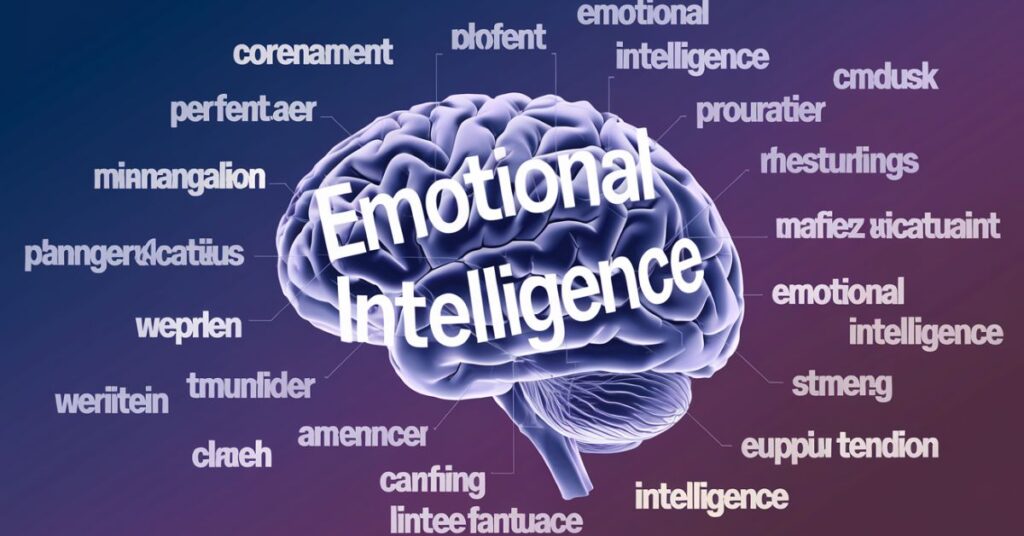In recent years, emotional intelligence (EI) has emerged as one of the most important concepts in both personal and professional development. It touches every aspect of life, from managing relationships to enhancing leadership skills. 16 Synonyms for “Emotional Intelligence” however, while “emotional intelligence” is a widely recognized term, it’s not the only way to describe the vast and nuanced set of abilities involved in understanding and managing emotions.
There are many synonyms for emotional intelligence, each highlighting different aspects of the concept. Whether you’re a leader looking to improve team dynamics, someone seeking to enhance your communication . Or simply interested in deepening your understanding of human emotions . exploring the 16 synonyms for emotional intelligence is an invaluable way to understand the many facets of emotional mastery.
Read Also : Role Call or Roll Call: Which Is Correct?In this comprehensive guide, we’ll explore 16 synonyms for emotional intelligence, delve into the significance of each term. Understand how they relate to the overarching idea of emotional intelligence. By the end, you’ll have a clearer picture of how .These synonyms can empower you to connect with others more effectively and enhance your emotional skills.
Understanding Emotional Intelligence
Before diving into the synonyms, it’s essential to understand what emotional intelligence means. Emotional intelligence is defined as the ability to recognize, understand, manage, and influence our own emotions and the emotions of others. Emotional intelligence plays a critical role in personal success and well-being. As it affects how we communicate, resolve conflicts, and build relationships.
In 1995, Daniel Goleman popularized the concept of emotional intelligence, breaking it down into five key components:
- Self-awareness: Recognizing and understanding your own emotions.
- Self-regulation: Controlling your emotional responses and managing your reactions.
- Motivation: Using your emotions to stay focused and driven toward your goals.
- Empathy: Understanding and sharing the feelings of others.
- Social skills: Building and maintaining healthy relationships with others.
These core elements make up the foundation of emotional intelligence, and as we explore the synonyms for emotional intelligence, you’ll see how each term corresponds to one or more of these components.
Cognitive Empathy
Cognitive empathy is the ability to understand another person’s thoughts, feelings, and perspective. Unlike emotional empathy, which involves feeling what others feel, cognitive empathy focuses on intellectual understanding. This skill is especially valuable in leadership and conflict resolution, as it allows individuals to grasp what others are experiencing without being emotionally overwhelmed by it.
Real-world application: Cognitive empathy is crucial in management, where understanding an employee’s perspective can lead to better decisions and more effective communication.
Acumen Social
Social acumen is the ability to navigate social situations with finesse. It involves understanding the social dynamics at play in any given scenario and adjusting your behavior accordingly. Social intelligence is a key component here, as it allows you to recognize the unspoken rules and norms within groups, enabling you to respond appropriately.
Real-world application: In business settings, social acumen helps leaders understand group dynamics, allowing them to communicate more effectively and make decisions that account for the emotions and needs of those involved.
Understanding Empathetic

Empathetic understanding goes beyond merely recognizing another person’s emotional state; it involves connecting with that person’s feelings on a deep level. This term is a synonym for empathy and speaks to the profound emotional resonance that fosters strong bonds between individuals. This connection is foundational in building trust and cooperation in relationships.
Real-world application: In therapy or counseling, empathetic understanding allows practitioners to connect with their clients’ emotions, offering the support and insight necessary for healing.
Relational Intelligence
Relational intelligence refers to the ability to manage relationships effectively, whether personal or professional. It involves understanding both your emotions and those of others and using that awareness to foster trust and cooperation. Relational intelligence emphasizes creating positive, productive connections with others.
Real-world application: Leaders with high relational intelligence can motivate teams, resolve conflicts, and create a collaborative atmosphere, ensuring that everyone works well together.
Read Also : What Is the Collective Noun for Keys?Emotional Quotient (EQ)
Emotional quotient (EQ) is the counterpart to intelligence quotient (IQ) and measures your ability to manage and regulate your emotions as well as the emotions of others. People with high EQ tend to be more successful in interpersonal relationships, as they can navigate emotional challenges with grace and understanding.
Real-world application: EQ is often a better predictor of success in leadership and teamwork than IQ, as it helps individuals navigate complex emotional landscapes and make decisions based on emotional data.
Personal Insight
Personal insight is the self-awareness component of emotional intelligence. It involves understanding your own emotions, strengths, weaknesses, and triggers. 16 Synonyms for “Emotional Intelligence” People with high personal insight are able to recognize how their emotions affect their behavior and the emotions of others, leading to more effective emotional regulation.
Real-world application: Personal insight allows individuals to stay grounded and make decisions that align with their values, especially when faced with challenging emotions.
Personal insight is crucial for emotional regulation, and it serves as a foundation for many other aspects of emotional intelligence, including empathy and relationship-building. It allows individuals to improve self-awareness and take proactive steps toward emotional growth.
Read Also : Other Ways To Say “Have a Great Weekend” (With Examples)People Skills
People skills encompass a range of abilities related to communicating, understanding, and building relationships with others. These skills include active listening, conflict resolution, and empathic communication. Strong people skills are vital for both professional and personal relationships.
Real-world application: In customer service, people skills help employees understand the needs and emotions of customers, leading to better service and improved customer satisfaction.
Social Intelligence

These refer to the ability to understand social dynamics and navigate complex social situations. It includes recognizing social cues, understanding group behavior, and adapting to different environments. This type of intelligence is essential for managing interpersonal relationships and succeeding in various social contexts.
Real-world application: In the workplace, social intelligence allows employees and leaders to adapt to different communication styles, creating an environment where collaboration thrives.
For example, a person with high social intelligence can immediately sense when a conversation is shifting in tone and adjust their approach accordingly. 16 Synonyms for “Emotional Intelligence” they may use humor to lighten the mood or steer the conversation in a more positive direction if the group becomes tense.
Empathic Intelligence
Empathic intelligence is the ability to deeply understand and feel what others are experiencing. It involves both cognitive empathy (understanding others’ emotions) and emotional resonance (feeling them as if they were your own). This term is closely linked to compassionate connection and fostering emotional bonds with others.
Real-world application: Empathic intelligence plays a critical role in helping leaders motivate their teams and build rapport with clients and colleagues, leading to long-lasting, positive relationships.
Read Also : Coach’s or Coaches’ or Coaches? Understanding the DifferencesRelationship IQ
Relationship IQ refers to an individual’s ability to foster and manage healthy, meaningful relationships. This term is closely aligned with relational intelligence, 16 Synonyms for “Emotional Intelligence” it emphasizes the importance of social awareness, effective communication, and emotional regulation in forming strong relationships.
Real-world application: High relationship IQ is essential for leaders who wish to create cohesive teams that collaborate and trust one another, ultimately driving business success.
Emotional Competence
Emotional competence refers to the ability to express emotions appropriately, control emotional impulses, and understand the emotions of others. It is a practical application of emotional intelligence, where individuals use their emotional skills to enhance their interactions and experiences.
Real-world application: In the workplace, emotional competence helps individuals stay calm under pressure, communicate effectively, and resolve conflicts with sensitivity.
Emotional competence is linked to emotional regulation, which involves managing impulsive reactions, controlling stress, and maintaining a positive emotional state. It is also connected to sensory perception—the ability to read emotional signals from others and respond accordingly.
Sensory Perception
Sensory perception is the ability to pick up on non-verbal cues that provide insight into how others are feeling. This includes body language, facial expressions, tone of voice, and other subtle signals that communicate emotional states. People with strong sensory perception are often highly attuned to the emotions of others.
Real-world application: In leadership, sensory perception allows managers to read the room and adjust their approach based on the emotional atmosphere, leading to more effective decision-making.
Read Also : Mastering English Spelling: “Comming” or “Coming”?Social Cognition
Social cognition refers to the mental processes involved in understanding, interpreting, and responding to social interactions. It includes the ability to read social situations, understand group behavior, and anticipate the emotional needs of others. Social cognition is a key component of emotional intelligence . 16 Synonyms for “Emotional Intelligence” As it helps individuals make informed decisions about how to navigate social environments.
Real-world application: Social cognition is essential for building relationships and creating intuitive connections with others. Especially in diverse environments where understanding cultural nuances is key.

Compassionate Intelligence
Compassionate intelligence is the ability to empathize with others and take action to help alleviate their suffering. It emphasizes emotional awareness and empathy but goes further by encouraging individuals to act in ways that support others emotionally and practically.
- Real-world application: Compassionate intelligence is critical in healthcare, counseling, and leadership roles where supporting others’ emotional needs is a central part of the job.
Mindful Awareness
Mindful awareness refers to the practice of staying present in the moment and being aware of your emotions without being overwhelmed by them. It is a form of self-regulation, where individuals can manage their emotional responses in real time.
- Real-world application: Mindful awareness is useful in high-pressure situations, allowing individuals to remain calm, composed, and make decisions based on clarity rather than emotional impulse.
Interpersonal Sensitivity
Interpersonal sensitivity refers to the ability to perceive and respond to the emotional cues of others. This includes recognizing subtle emotional signals and adjusting your behavior to meet the emotional needs of those around you.
- Real-world application: In negotiations or team environments, interpersonal sensitivity is crucial for understanding the emotional dynamics at play, enabling individuals to build rapport and resolve conflicts effectively.
Read Also : The Odyssey Gareth Hinds Literary DevicesConclusion
The 16 synonyms for emotional intelligence are more than just alternative ways of describing this important concept—they represent distinct aspects of emotional mastery. Whether it’s cognitive empathy, social intelligence, or emotional competence, each term sheds light on the various skills involved in understanding and managing emotions.
By exploring and cultivating these different facets of emotional intelligence, you can improve your ability to connect with others, resolve conflicts, and lead with empathy. Whether you’re looking to enhance people skills, improve interpersonal relationships, or foster emotional fluency, understanding the many synonyms for emotional intelligence provides a broader framework for navigating the complexities of human emotions.
FAQS
- What is emotional intelligence (EI)?
EI refers to the ability to understand and manage your emotions and recognize and influence the emotions of others. It includes skills like self-awareness, emotional regulation, and empathy. - How do cognitive empathy and emotional intelligence differ?
Cognitive empathy involves understanding others’ emotions intellectually. Emotional intelligence, on the other hand, includes a broader set of skills like empathy, self-awareness, and emotional regulation. - Can social intelligence be developed?
Yes, you can develop social intelligence by improving your communication skills, learning to read social cues . - What are the benefits of improving emotional intelligence?
Improving EI helps you communicate better, build stronger relationships, resolve conflicts more effectively, and make better decisions while managing stress. - How do I improve my emotional intelligence?
To improve EI, focus on developing self-awareness, practicing active listening, managing your emotions.

Jenni Maic is a creative wordsmith at Grammar Globe, where she brings humor and wit to the world of puns and English grammar. With a passion for playful language and a knack for simplifying grammar, Jenni’s articles make learning engaging and entertaining. Discover her work at https://grammarglobe.com/.







